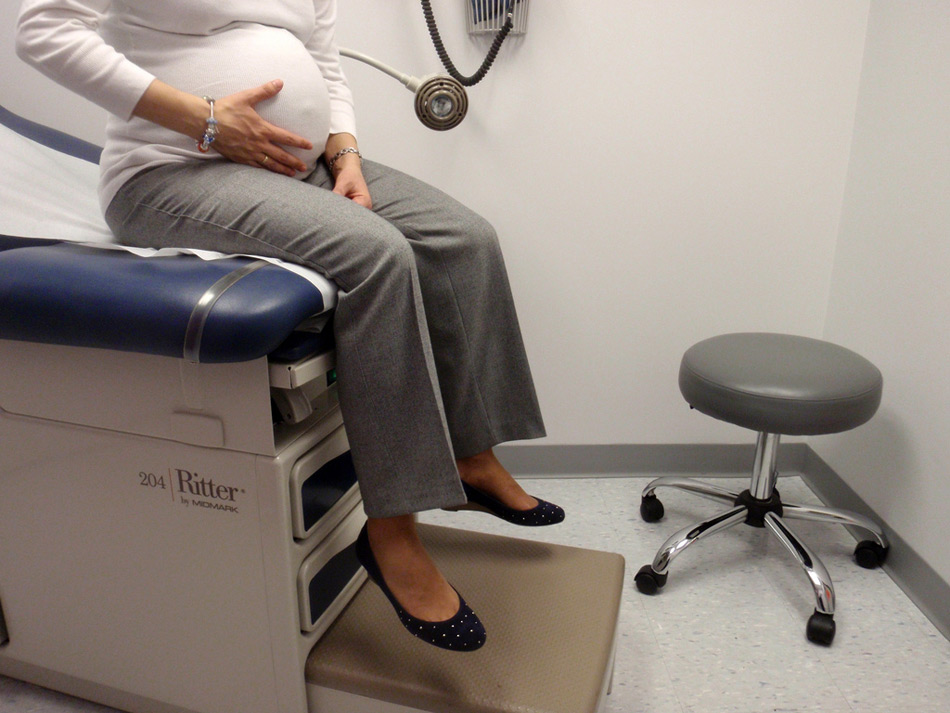 Employers must reasonably accommodate pregnant employees under state and federal laws. What those accommodations should be will vary depending on the needs of the employee and employer. If a pregnant employee asks for help but that request is denied, she should contact our office. Federal and state laws provide some protection for pregnant employees who want to work as long as possible.
Employers must reasonably accommodate pregnant employees under state and federal laws. What those accommodations should be will vary depending on the needs of the employee and employer. If a pregnant employee asks for help but that request is denied, she should contact our office. Federal and state laws provide some protection for pregnant employees who want to work as long as possible.
Police Officer Denied Accommodations
 One example of a pregnant employee who stood up for her rights is Shannon Sawyer. She is a police officer in Pemberton Township, New Jersey, who was denied her requested accommodation of light-duty work during her pregnancy, according to the Philadelphia Inquirer. Sawyer sued the police department in state court because she was told she had to perform all of her regular duties or not work at all.
One example of a pregnant employee who stood up for her rights is Shannon Sawyer. She is a police officer in Pemberton Township, New Jersey, who was denied her requested accommodation of light-duty work during her pregnancy, according to the Philadelphia Inquirer. Sawyer sued the police department in state court because she was told she had to perform all of her regular duties or not work at all.
Sawyer’s lawsuit alleged that township administrator Dennis Gonzalez discriminated against her by forcing her to take a leave of absence when she was in her third month of pregnancy even though she had no health issues. Though the township council voted to allow her back to work last February, Gonzalez ignored their unanimous vote and refused to allow her to perform desk duty that had been approved by Police Chief David Jantas.
Gonzalez stated that the case was settled because the insurance company did not want to pay the cost of litigation. Whatever the reason, Sawyer received $150,000 to compensate her for lost pay and benefits as well as paid time off as reimbursement for the time she was forced to stay home.
Sawyer’s attorney told the Inquirer the following facts:
- Her bulletproof vest and gun belt had become uncomfortable, which led her doctor to suggest she work light duty.
- The police chief arranged for light-duty work that only a police officer could do.
- In the past, another female patrol officer had been assigned desk duty when she was pregnant. She worked nearly up until the time she had delivered.
- Sawyer was told by Gonzalez she could not work light duty and she could also no longer continue on patrol because she would be a “liability.”
- Sawyer was told last January that she needed to use all her accrued paid time off then use unpaid family leave, so she exhausted all of the time she was entitled to take last year by May, nearly two months before the Sawyer gave birth to her son.
Gonzalez claimed allowing Sawyer, who makes $85,000 a year, to do the work of a much lower-paid clerical employee would be a waste of money. Jantas claimed the work she could have done could only be performed by a police officer.
Laws Covering Pregnant Employees
 Pregnancy accommodation rights are covered by the federal Pregnancy Discrimination Act (PDA), the Family and Medical Leave Act, and the Americans With Disabilities Act Amendments Act (ADAAA).
Pregnancy accommodation rights are covered by the federal Pregnancy Discrimination Act (PDA), the Family and Medical Leave Act, and the Americans With Disabilities Act Amendments Act (ADAAA).
- The PDA amended Title VII of the Civil Rights Act of 1964 so that discrimination due to pregnancy, childbirth, or related medical conditions constitutes unlawful sex discrimination. The law covers employers with 15 or more employees, including state and local governments. Women who are pregnant or have pregnancy-related health conditions need to be treated just as other job applicants or employees with similar abilities or limitations.
- The FMLA provides 12 weeks of unpaid leave for pregnancy-related health issues and giving birth for employees who have worked long enough for the employer (at least 12 months) if the employer is big enough (it has 50 or more employees). The employer may require the employee to use up paid time off before getting unpaid time off.
- The ADAAA broadened the definition of “disability” under the Americans With Disabilities Act (ADA) to include more temporary, less severe conditions, such as pregnancy-related impairments. The law mandates reasonable accommodations for employees as long as the employer does not suffer an undue hardship as a result.
Local laws also have protections for pregnant employees:
- Maryland requires employers to provide reasonable accommodations for pregnancy-related disabilities.
- In the District of Columbia, employers must make reasonable accommodations for an employee’s known limitations related to pregnancy, childbirth, and related medical conditions unless doing so would impose an undue hardship on the employer.
- Employers covered by the Virginia Human Rights Act must provide the same leave benefits to women disabled by pregnancy that are provided to other employees with temporary disabilities.
Accommodations for Pregnant Employees
 Medical opinions on what pregnant women can and cannot do or should or should not do have changed over the years. Generally, more activity is encouraged throughout the pregnancy, and even in some pregnancies with complications, medications may be more effective than bedrest.
Medical opinions on what pregnant women can and cannot do or should or should not do have changed over the years. Generally, more activity is encouraged throughout the pregnancy, and even in some pregnancies with complications, medications may be more effective than bedrest.
- The environments most supportive of the physical needs of pregnant employees are those where the employee makes a variety of movements but is able to rest as needed.
- Many other physical jobs such as nursing or law enforcement can involve physical activity for hours with unpredictable times for breaks or eating.
- Jobs with exposure to chemicals or radiation may be covered by federal Occupational Safety and Health Administration regulations, which may require employees to wear gloves, masks, or other personal protective equipment.
- In jobs where employers require workers to stand for long periods, the use of a chair or stool can be very helpful, but management may be reluctant to set a precedent.
Some possible accommodations for pregnant employees include the following:
- physical changes, such as lifting aids, temporary reassignment of duties, reserved parking, stools, ergonomic chairs, reassignment to less physically demanding jobs, and alternate workstations;
- schedule changes, such as periodic rest, food, water and bathroom breaks, telecommuting, a less physically demanding shift, limited overtime, and flexible use of leave; and
- policy modifications, including exceptions to a dress code as well as relaxed “no food or drink” and “no-sitting” policies.
Whatever help an individual employee may need for a particular job, it is key that the employee and management engage in an interactive dialogue to reach a reasonable accommodation. If either party takes a “my way or the highway” approach, the party will probably not win the case if a lawsuit is filed. If management endlessly discusses and delays taking action, that could be seen as a refusal to accommodate the employee.
Summing It Up
Pregnant employees have legal rights to allow them to work as long as they can to minimize the financial loss of taking time off due to a pregnancy-related health condition or to give birth.
- An employee may be entitled under the law to an accommodation to her job duties or environment.
- An employer need not provide an accommodation if it results in an undue hardship to its operations.
- These situations are very fact specific, and what may work in one situation may not work in another.
If you are pregnant and have questions about your rights, contact our office. Because each case is unique, you should talk to an attorney who can ask you about your situation to give you a better idea of your options, to suggest what your employer should do, and to explain both parties’ rights and responsibilities under the law.




